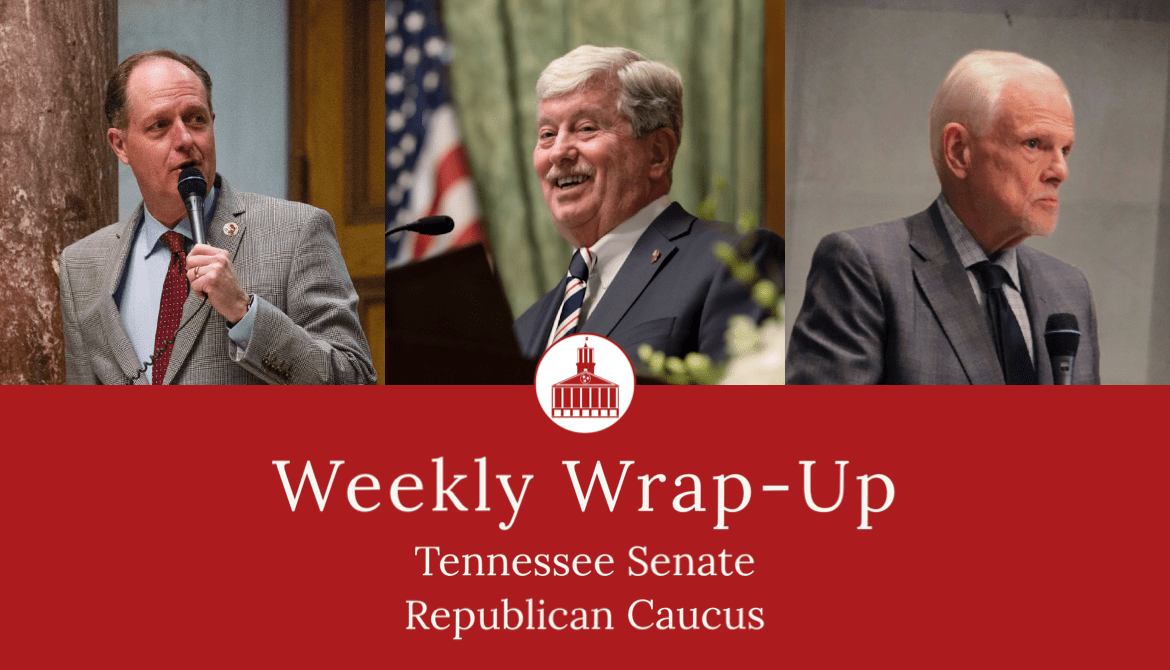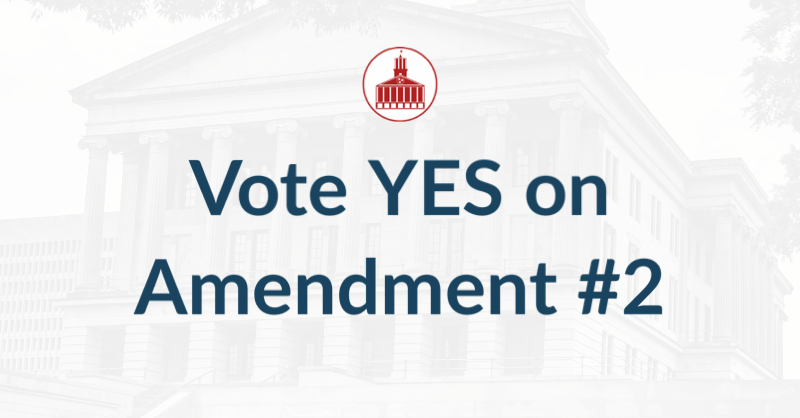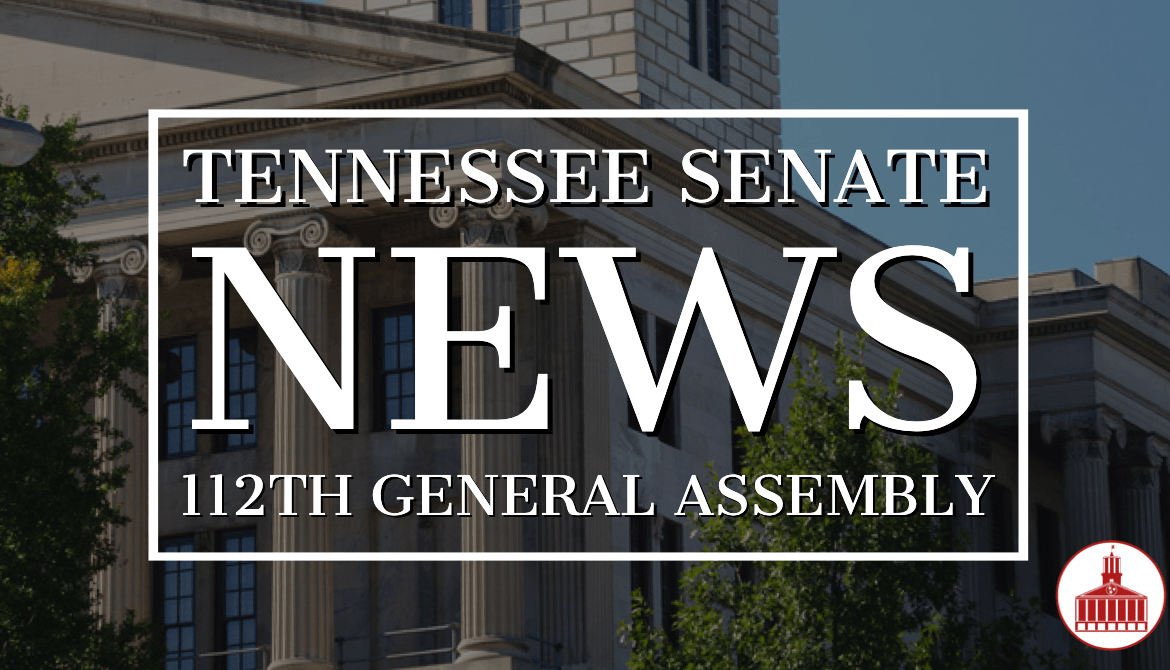(NASHVILLE) February 3, 2023 – This week, Senate committees voted on legislation and continued to hear reports from various agencies and organizations. Legislation passed committees to protect children from irreversible medical procedures to change their gender identity and inappropriate sexual performances. To help provide better care to children in state custody, Senators announced over fifteen bills aimed at improvements to DCS and adoption and foster care services. The Tennessee Investment in Student Achievement (TISA), a major education funding reform passed in 2022, is one step closer to being implemented in the 2023/2024 school year after the Joint Government Operations Committee gave a positive recommendation to the new TISA rules. In the Senate Health Committee, TennCare provided a report on their plan to phase out expiring federal funding from the pandemic and resume its income verification process. More information can be found on these issues and other Senate news in this week’s wrap-up.
Next week, Governor Lee will make his 2023 State of the State address on Monday, February 6 in a joint session of the General Assembly, where he will unveil his 2023 budget proposal.
Health Committee advanced legislation prohibiting irreversible medical procedures to change gender identity of child
Legislation that would prohibit minors from undergoing irreversible and harmful medical procedures to change their gender identity is one step closer to becoming law. Senate Bill 1, sponsored by Senate Majority Leader Jack Johnson (R-Franklin), was approved in the Health Committee this week. The bill seeks to ban medical interference that alters a child’s hormonal balance and procedures that remove body parts to enable the minor to identify as a gender different from their biological sex.
“This legislation is about protecting children from harmful, life-altering and experimental medical procedures with unknown long-term effects,” said Johnson. “But we know that children who have these procedures are forfeiting healthy reproductive systems and subjecting themselves to lifelong hormone treatment. The weight of these decisions is too heavy for children. As a society, we understand that minors need limitations, so we place many age-restrictions on activities for children that can have lifelong consequences such as smoking, drinking alcohol, buying lottery tickets and even getting tattoos. It is reasonable to also put age-restrictions on these transformational elective medical procedures.”
If passed, a healthcare provider who violates the law can be sued in civil court by the minor injured, the parent of the minor injured or the Attorney General within 30 years of the violation. Providers found to be in violation could face up to a $25,000 penalty per violation and have their medical license restricted.
The legislation ensures that doctors can still prescribe hormone treatment to minors for medically necessary purposes and makes exceptions for children born with chromosomal anomalies or congenital defects.
The legislation advances to the Senate Judiciary Committee.
Legislation protecting children from exposure to sexually explicit adult entertainment passes Judiciary
Another bill that seeks to protect children from inappropriate activities was approved in the Senate Judiciary Committee this week. Senate Bill 3, sponsored by Johnson, aims to protect children from being exposed to sexually explicit performances. It would restrict adult cabaret performances that appeal to a prurient interest from being performed on public or private property if kids could be around to see it.
Under the bill, private establishments, such as bars or restaurants, that host sexually explicit shows must require patrons to show ID upon entry to ensure they are age 18 or older. Johnson says this is a common-sense protection that provides clarity regarding what performances are not appropriate for children.
“This legislation is about protecting children,” said Johnson. “There are certain performances, movies, and places that are inappropriate for children. Just as current law prohibits strip clubs from admitting children, this legislation would also prohibit sexually explicit adult entertainment from being performed on public property or any non-age-restricted private property where a minor could be present. This is a common-sense measure with broad support from Tennesseans.”
“It also gives confidence to parents that they can take their kids to a public or private show and will not be blindsided by a sexualized performance,” Johnson added.
A violation of this bill would result in a Class A misdemeanor, and a second or subsequent offense would result in a Class E felony.
The legislation now advances to the Senate floor to be considered by the full Senate.
Lawmakers propose bills to make adoption easier
On Monday, Senate Speaker Pro Tempore Ferrell Haile (R-Gallatin) led the Adoption and Foster Care Caucus meeting where lawmakers announced over 15 bills aimed at improving the adoption and foster care process in the state such as removing red tape in the adoption process, increasing the number of children that someone can watch in their home and reducing the caseload of Department of Children’s Services (DCS) caseworkers.
“As a pro-life lawmaker, it is imperative we protect life not only of the unborn but also beyond the point of birth. This means we have to strengthen the social welfare system that takes care of children in Tennessee,” said Haile. “We need to make adoption and foster care cheaper, easier and quicker so that we can increase the number of adoptive and foster care families in Tennessee. I am very proud of the work we have done over the last six months to craft legislation that will make a positive impact in the lives of Tennessee children.”
Among the legislation is a comprehensive bill that aims to make improvements to the adoption and foster care process by eliminating red tape. Senate Bill 528, sponsored by Haile, would allow more time for adoptive parents to pay for birth related expenses, allow foster parents to be involved in court proceedings, prohibit the overturning of adoptions after six months and increase options for pre-birth and post-birth surrenders.
TISA Rules pass Joint Gov Ops Committee
The Tennessee Investment in Student Achievement (TISA) cleared an important hurdle Monday morning that ensures its implementation for school districts across the state next school year. The Joint Government Operations Committee gave a positive recommendation to new rules that will govern TISA when it replaces the Basic Education Program (BEP) in the 2023/2024 school year. TISA invests a billion dollars into K-12 education and will fundamentally change the way public schools are funded to be based on individual student needs.
TISA specifically requires rulemaking in certain areas to further flesh out the law, define terms, and establish processes and procedures for funding. The TISA rules approved Monday by the Joint Government Operations Committee include a number of changes resulting from an extensive public engagement process last year. Some of the new rules approved include:
- New language emphasizing special education students be taught in the least restrictive environment.
- Clarification that high schools can utilize the early warning system already in place statewide to identify students with Dyslexia.
- Utilizing English proficiency scores to determine eligibility for English learner bonuses.
- Funding Career Technical Education (CTE) programs by a ranking system of in-demand and high-wage earning career data.
- Bonuses for English learners and students with disabilities to be consistent across all grade levels.
In Brief
TennCare to restart annual income reviews post-pandemic – In the Senate Commerce and Insurance Committee on Tuesday, TennCare reported that it will resume its income verification process on April 1 after being suspended for three years due to the COVID-19 pandemic. TennCare says it is updating its renewal process to make it as easy as possible for enrollees to renew their plans. During the pandemic, the state received funds from the enhanced Federal Matching Assistance Program (eFMAP). which suspended enrollment verification and prevented TennCare from removing enrollees who otherwise would have been ineligible. As a result, TennCare has record high enrollment. These federal funds will be phased out over 4 quarters in 2023 which will allow TennCare to remove ineligible enrollees. Once the renewal process is completed, it is estimated that TennCare enrollment will be back to pre-pandemic levels.
2023 state budget outlook — The Senate Finance, Ways and Means Committee this week hosted the Sycamore Institute, a nonpartisan research center for Tennessee, for a presentation on the 2023 state budget projections. The presentation reviewed the historically high end-of-year budget surpluses the state has seen since 2021. The state funding board estimates that overcollections in 2023 will be around $2.6 billion more than the budgeted estimate of $19.6 billion. In 2024, surplus revenue is expected to reach $2.9 billion.
Another part of the presentation touched on Tennessee’s rainy-day fund, which is at historic highs. Just before the Great Recession, the fund had amassed about $1.1 billion before it was spent down to $422 million. Since then, the legislature has consistently replenished the fund, which is set to reach $3.1 billion in 2023. That includes both the reserve for revenue fluctuations and TennCare. The rainy-day fund alone could cover General Fund operations for a total of 62 days based on 2021 fund levels.
Exploring alternative transportation funding sources — As the legislature is expected to address ways to improve funding to the state’s highway fund, a couple of presentations on alternative transportation funding options were delivered at the Senate Transportation and Safety Committee this week. The presentations centered on mileage-based user fees (MBUFs) as a potential replacement of the state’s fixed-rate gas tax, which has been the primary funding source for transportation in Tennessee for over 100 years. Baruch Feigenbaum, senior managing director of the Reason Foundation, pointed out flaws with the state’s gas tax due to the increasing prevalence of electric and hybrid vehicles and improving fuel efficiency of conventional vehicles. He also noted the fuel tax has lost 50% of its purchasing power over the last 30 years.
Known also as a road usage charge or vehicle miles traveled fee, MBUFs charge motorists a fee based on the number of miles driven as opposed to the amount of gas consumed. The fee is typically between 1.5 cents to 2 cents per mile. More than 20 states have or will soon implement an MBUF pilot program, including Tennessee’s neighboring states of North Carolina and Georgia, and three states have permanent MBUF programs, one of which is Virginia.
MBUFs are only one option to address highway funding. Governor Lee has proposed new ways to increase funding to the state’s highway fund without changing the gas tax. The Transportation Committee will consider these proposals in the coming weeks.
State Apiarist shares ways to help increase bee population in Tennessee – The Energy, Agriculture and Natural Resources Committee heard from Tennessee State Apiarist, Mike Studer, who emphasized the decline in the bee population and said that education was needed to increase the number of bee colonies in Tennessee. If the bee population continues to suffer, food and crop production in Tennessee might be harmed because of the lack of bees to pollinate plants. Studer said to increase the bee population, beekeepers need more education on how to safely remove varroa mites, which transmit diseases among bees, and how to safely use pesticides. These mites and misuse of pesticides are leading contributors in the death of bees.




